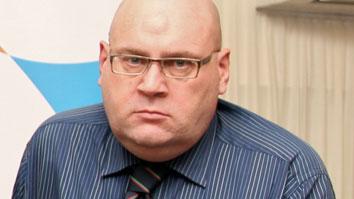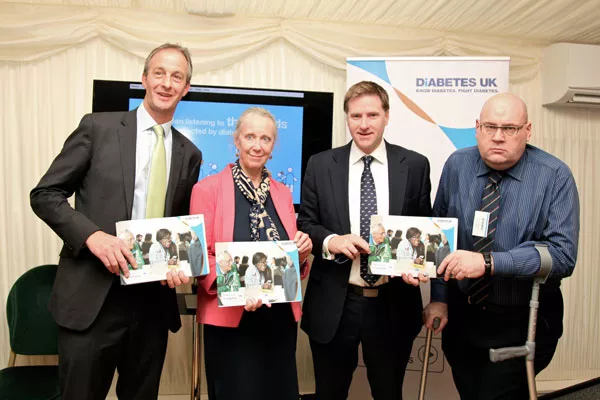
I was first diagnosed with Type 2 diabetes in 2015 but this is not where my diabetes story begins.
This story began back in 1995, when I started suffering some mental health difficulties, but it was not until 2012 that I was given a diagnosis of post-traumatic stress disorder (PTSD) from a psychiatrist. I developed PTSD following my active service in the army while I was taking part in the first Gulf war in 1990-1991, where I was attached to a combat engineer unit to provide infantry support and protection.
In order to cope with my PTSD, I started comfort eating. My knees were knackered as I had been diagnosed with osteoarthritis in both knees and undergone knee replacement surgery on both knees. I was taking medication to deal with the PTSD. This is medication that gives people issues with weight gain. And despite my GP telling me to be careful and doing all I could to be careful, it was impossible and my weight ballooned.
It was at this point, in 2014, I began to suspect I had diabetes. I started having trouble with my feet, and I was peeing all night. I decided to go to my doctor and tell them I thought I had diabetes. I was right. But it took about a month before my diagnosis was confirmed and I found out I had Type 2 diabetes, it came as a major shock as it was another problem to add to my other medical issues.
Initially, I struggled with a doctor who just wasn’t interested in me. I was a patient. They were a doctor. There were very clear roles here. They didn’t want to know about me, or how I was feeling, and just handed me over my medication and would be done with me.
This all changed when I changed my doctor, who is the practice's diabetic lead and was also appointed as my care coordinator. Dr Emilie Strawson has so much empathy it’s unbelievable. She made the suggestion to me that I write down all the questions I have in advance of our appointment so I don’t miss anything. She has an open dialogue with me, and it made such a huge difference.
Despite an improved experience with my GP, I still struggled. I was still coping with my PTSD, my mental health issues the ongoing issues with my knees and was now additionally coping with my Type 2 diabetes diagnosis. My blood sugars at this point were around 16/ 17. I was up all night peeing and wasn’t sleeping well. I was prescribed onto a diet. But this is depressing. I was put onto insulin. I was provided with yet more medication. I didn’t want to take anymore medication than I already was.
I felt like I had tried everything. But then my GP referred me for a gastric bypass. I had my surgery in March of this year. The past eight months have been a huge rollercoaster. But a fun one. I’ve lost 5 ½ stone, my blood sugar readings after surgery were down to 5/6 and I’m off my diabetes medication. I visit the gym 3 or 4 days a week – for 90 minutes each visit. More importantly I felt motivated to take action.
So what are my hopes for the future?
I sometimes stop and think about those who aren’t so lucky. Lucky with their healthcare professionals or those who haven’t discovered the trove of information available from Diabetes UK. It gives me considerable food for thought for what the future of diabetes should look like.
People with diabetes need to get the appropriate information and support that doesn’t overwhelm them. I discovered Diabetes UK by chance when looking at a leaflet in my local Tesco. I went along to a Roadshow and registered with the charity in 2015. I was amazed about the amount of information you have on your website – I didn’t know anything about the 15 healthcare essentials until I saw your website. And I wish that everyone who receives a diagnosis finds out about your website and the information you provide.
Support
But it’s not just information provided. Peer-to-peer support and discussion is equally vital. I got involved in Diabetes UK’s forums and communicated online with people with diabetes. I even found my local Diabetes UK support group in Fulham. Where I can meet up with other diabetics and pick up helpful hints and tips from other people with diabetes. This is jargon free and I’ve learnt about my condition and how other people have coped with their condition.
On top of all this, I hope that in the future everyone will have access to doctors and nurses who are empathic and see you as a person. You need one point of contact and one port of call which outlines all the support you’re entitled to and what you need to manage your diabetes well.
Finally, I hope for a future without the stigma. I don’t want people to feel ashamed they have diabetes and are prepared to go to their doctors if they think something is wrong. There are bound to be people out there today who are suffering from diabetes and don’t want to approach their doctor because of the stigma.
I’m so glad I found Diabetes UK and all the support you offer. The Big Conversation event was inspiring. It’s so important that we, the people with diabetes, are asked what we want, what we think you’re doing right, what we think is going well and not so well. We have the experience to help make things better. And with your support and the support of other healthcare professionals and politicians who are in the room, I believe we can get to a future where our hopes are realised – a future where diabetes can do no harm.
My journey has been a rollercoaster – the good, and the bad - but I’m also here talking to you now. It’s time to give a little a bit back.
Colin shared his story in the above speech which he gave at the launch of Diabetes UK's Future of Diabetes report at Terrace Pavilion at the Houses of Parliament in November 2017.

